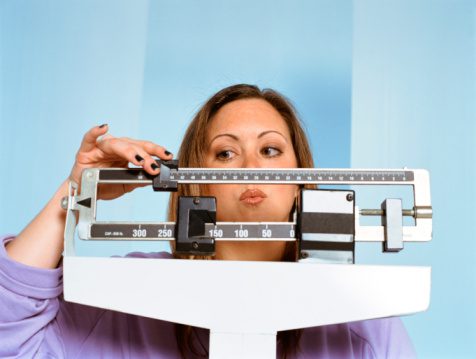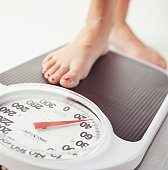Lose Weight Healthfully

Triathletes are no strangers to the challenges of getting to their optimal race weight. Some athletes can achieve the demanded lightness healthfully; others get into trouble. Nancy Clarke offers some tips on how to best achieve your weight goals without jeopardizing your health.
It is no secret that disordered eating is common among weight-conscious athletes. An estimated 30-60% of active women and 19% of active men struggle with finding the right balance of food and body-fatness. Their quest to be light easily leads to restrictive food intake, over-exercising and too little fuel to support normal body functions. In women, strict diets trigger amenorrhea —loss of regular menstrual periods. While some women seem content to get rid of that monthly hassle, they lack knowledge that amenorrhea leads to weaker bones, a higher risk of stress fractures (today) and early osteoporosis (in the future). It’s hard to be an athlete when your skeleton won’t support your goals.
While the combination of amenorrhea, disordered eating, and stress fractures has been dubbed “The Female Athlete Triad,” today’s sports medicine professionals acknowledge that men also experience medical issues. For example, a study of competitive male cyclists suggests as many as 25% had osteopenia (the early stages of osteoporosis) and 9% had full-blown osteoporosis (low bone density); the exact cause is unclear.
Up to 94% of elite athletes who participate in weight sensitive sports report dieting and using extreme weight control measures to achieve their desired weight. They commonly experience dizzy spells, needless fatigue, headaches, constipation and poor sleep. Symptoms of long-term under-eating include hair loss, dangerously low heart rate (<40 beats/minute), electrolyte imbalance, constipation, anemia, stress fractures, social withdrawal, insomnia, mood swings and inability to concentrate well—to say nothing of poor performance.
After all, you can only perform at your best if you can train at your best. You can only train at your best if you are doing a good job of fueling up before training and refueling well afterwards. Long-term food restriction can easily lead to medical complications that involve the whole body: intestines, heart, hormones, reproductive system, bones, kidneys and brain. It creates psychological stress & depression.
Hence, athletes who need to make weight should take the job seriously—not simply resort to starving and dehydrating their bodies pre-event.
Here are tips to help you make weight healthfully:
- Obviously, the best time to lose weight is during the off-season. But athletes, being human, often procrastinate until the last minute to complete this task.
- Avoid losing more than 2% of your body weight via pre-event dehydration. That’s 3 lbs. for a 150-lb athlete.
- Find a health professional who can monitor your body fat. If you are a man, do not drop below 5% body fat. Women shouldn’t drop below 12% fat.
- Do not eat less than your resting metabolic rate (RMR), the energy needed for your heart, organs and brain to function. A rough estimate for RMR is body weight times 10 calories per pound. For example, if you weigh 150 pounds, you need about 1,500 calories to simply breathe and be alive. That’s the equivalent of three 500-calorie meals—plus you need more for daily activities and sports. A registered dietitian (RD) can calculate the right calorie budget. Use the referral network at SCANdpg.org to find your local “food coach/RD.”
- Simpler yet, knock off 400 to 800 calories from your typical day’s intake. Deleting two beers (300 calories) and a granola bar (200 cals) could be an easy start to weight loss.
- To minimize loss of muscle, be sure to consume 20 to 30 grams of protein every 3-4 hours, depending on your body size (more precisely, 0.7 to 1 g pro/lb body wt; 1.5 to 2.0 g Pro/kg). That means, 3 eggs for breakfast, 2 (6-oz) tubs of Greek yogurt mid-morning, a can of tuna for lunch, 1 cup cottage cheese mid-afternoon, and a chicken breast for dinner.
- Include carbohydrates to fuel your muscles! Target 1.5 g carb/lb body weight (3 g carb/kg). For a 150-pound athlete, that means 225 grams of carbs (900 calories), preferably more. Divided into meals and snacks, that 60 g carb/meal and 30 g each for a morning and mid-afternoon snack.
- Include a little fat in each meal to add satiety (keep you feeling fed), as well as to absorb vitamins A, D, E and K. Choose nutrient-dense fats, such as avocado, peanut butter, almonds and salmon.
- Surround your workout with fuel. That is, eat part or all of your breakfast before you train, so that you have the energy to exercise meaningfully. Include both carbs (to fuel the workout) and protein (to minimize muscle breakdown). This could be oatmeal with milk and raisins before you workout;
eggs with toast afterwards. - Plan to eat recovery foods soon after you train. To avoid extra calories, simply back your training into a meal. That is, if you train from 3:00 to 5:00 in the afternoon, eat dinner right way (as opposed to recovery food at 5:00, and dinner at 7:00).
- To help prevent eating disorders and over-focusing on weight, try to keep your whole life in balance.
- Your whole identity should not be based on being an athlete, but rather on being a person who is athletic and has other interests. After all, if you identify yourself as a marathoner, who will
you be if you get badly injured and cannot run? - If you wonder if you have crossed the line and have an eating disorder, take this little quiz: https://ow.ly/VBZxK. If you answer yes to 2 of the 5 questions, seek help from a sports dietitian.
Here’s to healthful weight management!
Sports nutritionist Nancy Clark MS RD CSSD has a private practice in the Boston-area (Newton; 617-795-1875), where she helps both fitness exercisers and competitive athletes create winning food plans. Her bestselling Sports Nutrition Guidebook, and food guides for runners, cyclists and soccer players, as well as teaching materials, are available at nancyclarkrd.com. For workshops: NutritionSportsExerciseCEUs.com

